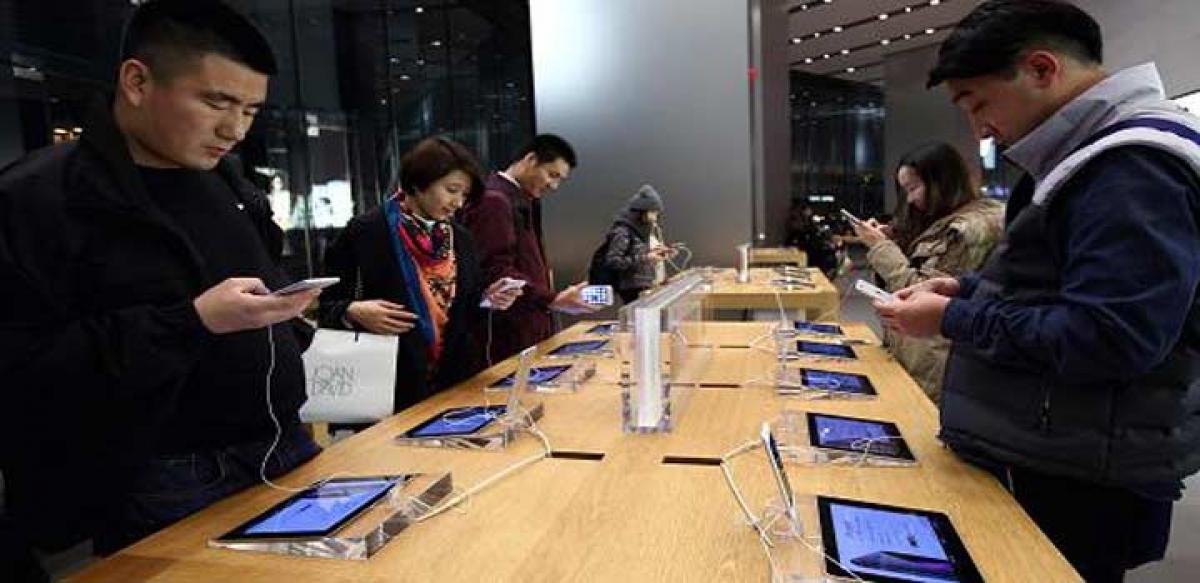Live
- Over 7,600 Syrians return from Turkiye in five days after Assad's downfall: minister
- Delhi BJP leaders stay overnight in 1,194 slum clusters
- Keerthy Suresh and Anthony Thattil Tie the Knot in a Christian Ceremony
- AAP, BJP making false promises to slum dwellers for votes: Delhi Congress
- 'Vere Level Office' Review: A Refreshing Take on Corporate Life with Humor and Heart
- Libya's oil company declares force majeure at key refinery following clashes
- Illegal Rohingyas: BJP seeks Assembly session to implement NRC in Delhi
- Philippines orders full evacuation amid possible volcanic re-eruption
- Government Prioritizes Welfare of the Poor, says Dola Sri Bala Veeranjaneyaswamy
- Two Russian oil tankers with 29 on board damaged due to bad weather
Just In

Belt-tightening by Chinese triggers global concern. Terry Xu considers himself one of the lucky ones. The 32-year-old father-of-one invested 10 per cent of his savings earlier this year in Chinese stocks.
If domestic Chinese demand growth fell by 2 percentage points for two straight years, combined with a 10 per cent fall in global equity markets, it would shave around 0.25 percentage points off the pace of US GDP, and more than half a percentage point off Japan's already-sluggish growth by the second year
Shenzhen: Terry Xu considers himself one of the lucky ones. The 32-year-old father-of-one invested 10 per cent of his savings earlier this year in Chinese stocks. Now, with markets down around 40 per cent since mid-June, he's selling off his portfolio at a loss. Painful, but not a catastrophe – he says his colleagues lost more, and he earns well above the average wage.
.jpg)
But the equity market turmoil, coupled with signs the economy is slowing means Xu, and millions of other middle class Chinese consumers like him are scaling back their spending in an ominous sign for China's policymakers and the global economy. "This year's economy has been uncertain. It's not like before, where we just used to buy everything for our child. Now, we only buy and spend what we need,” said Xu.
Xu's worries are typical of middle class families - relatively minor compared with the millions of his compatriots who get by on lower incomes. But his belt-tightening jars with the Chinese government's hopes that consumers will pick up the slack as exports fall and it tries to rebalance the economy away from a long-running reliance on trade and government spending.
Domestic consumption contributed 60 per cent of China's economic growth in the first half of 2015, up from 51.2 per cent in the whole of 2014, suggesting Beijing's desired rebalancing is on track. But forward looking indicators and companies' experiences in China are more worrying. A China consumer confidence index produced by ANZ Bank and polling company Roy Morganfell to a record low in August.
Car sales in China could drop this year for the first time in two decades, while smartphone sales recorded their first fall in China during the second quarter, consumer research firm Gartner said. If that translates into a slowdown in overall consumer spending, the impact will be felt beyond China. Last week US Federal Reserve chair Janet Yellen said concerns over a China slowdown were partly behind the central bank's decision to hold rates.
Global GDP growth, estimated by the IMF to be 3.3 per cent this year, would be about half a percentage point lower if there were a sharp fall in Chinese demand, according to study released this month by the OECD. The study projected that if domestic Chinese demand growth fell by 2 percentage points for two straight years, combined with a 10 per cent fall in global equity markets, it would shave around 0.25 percentage points off the pace of US GDP, and more than half a percentage point off Japan's already-sluggish growth by the second year.
Japan's exports to China, its largest trading partner, fell 4.6 per cent in August from a year earlier, partly due to falling shipments of car parts to Chinese factories, where activity has fallen to a six-and-a-half year low. No more foreign brands Many of the world's biggest companies are feeling the effects of weaker Chinese consumer demand. Volkswagen's high-end Audi brand said this month it had eased back output at its China plants.
German rival BMW has reduced output of its locally produced 3 and 5 series models. Apple shares have fallen 13 percent since July 21, partly on China worries, though chief executive Tim Cook said its third quarter performance has been "reassuring". Other Western consumer companies, though, flagged in their second-quarter earnings that China was turning into a tough market, before most of the recent equity market turbulence.
By James Pomfret

© 2024 Hyderabad Media House Limited/The Hans India. All rights reserved. Powered by hocalwire.com







